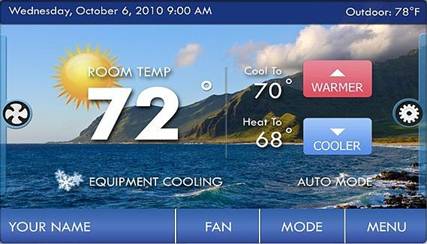Controller and Thermostat
Thermostat: basic boiler thermostat
Every boiler has a thermostat:
- This is a basic thermostat, present on the boiler itself.
- It measures the temperature of the water circulating within the boiler and keeps it constant.
- It measures the internal temperature of the system, it is indifferent to the room temperature, but by varying it manually, you can regulate the heating accordingly.

Room thermostat: essential :
- The room thermostat is normally set to a comfortable temperature setpoint: 18°C, for example.
- Connected directly to the burner of the boiler, it modulates its operation so as to maintain the room temperature constant.
- It is normally placed in a reference room (living room, hallway) where the temperature is supposed to be uniform and can measure and correct for variations in temperature in the house.
- Using room thermostats to control individual room temperature canquickly produce energy savings of around 10%.
Programmer:
Programmers modulate the heating according to the time of occupation of the home, they usually offer three plans:
- comfort mode: where heating is operated normally: in the evening for example.
- economy mode: where the heating is background for overnight or for short absences.
- frost fashion: for prolonged absences, holidays: where heating is idle.
The programming can be done:
- based on time: 8 am to 10 pm, for example.
- depending on the time of day: day / night, morning / afternoon / evening.
- depending on the day of the week working days / weekends.
Three distinct advantages:
- Energy savings: heating is active only when necessary! If during the day, there is no one at home, you can choose to pause the heating.
- Increased comfort: it helps to anticipate your needs. Heating the bathroom starts up 1/2 hour before you wake up.
- This is automatic once you have set the device, you do not have to touch anything.
The cost of installing a programmer can be quickly recovered due to the significant savings generated.
Outdoor sensor: to anticipate climatic variations
- The sensor measures the temperature outside the house.
- It then propagates the changes to the climate system of the boiler.
- It keeps a constant temperature still inside the home and shortens the normal system response.
- It proves especially useful with floor heating systems which have a less rapid heating response.
Thermostatic valves
- They allow you to adjust the heating of each heating radiator separately. They are placed on each radiator: 1 per unit.
- They operate on the temperature of the water flowing through the radiators. They do not operate on rapid heating: putting the thermostatic valve on a setting of 5 will not make it heat up more quickly!
- They are mostly graded as follows:
GRADUATION |
TEMP |
||
* |
I |
7 ° C |
|
1 |
12 ° C |
|
|
2 |
II |
16 ° C |
|
3 |
III |
20 ° C |
|
4 |
IIII |
24 ° C |
|
5 |
> 25 ° C |
|
|
Heating Systems
Types of heating system
Hot Water
Heating system Estimates
